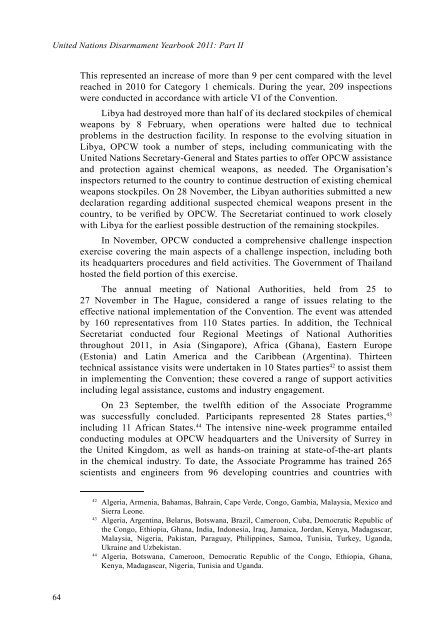DYB2011-Part-II-web
DYB2011-Part-II-web
DYB2011-Part-II-web
Create successful ePaper yourself
Turn your PDF publications into a flip-book with our unique Google optimized e-Paper software.
United Nations Disarmament Yearbook 2011: <strong>Part</strong> <strong>II</strong><br />
64<br />
This represented an increase of more than 9 per cent compared with the level<br />
reached in 2010 for Category 1 chemicals. During the year, 209 inspections<br />
were conducted in accordance with article VI of the Convention.<br />
Libya had destroyed more than half of its declared stockpiles of chemical<br />
weapons by 8 February, when operations were halted due to technical<br />
problems in the destruction facility. In response to the evolving situation in<br />
Libya, OPCW took a number of steps, including communicating with the<br />
United Nations Secretary-General and States parties to offer OPCW assistance<br />
and protection against chemical weapons, as needed. The Organisation’s<br />
inspectors returned to the country to continue destruction of existing chemical<br />
weapons stockpiles. On 28 November, the Libyan authorities submitted a new<br />
declaration regarding additional suspected chemical weapons present in the<br />
country, to be verified by OPCW. The Secretariat continued to work closely<br />
with Libya for the earliest possible destruction of the remaining stockpiles.<br />
In November, OPCW conducted a comprehensive challenge inspection<br />
exercise covering the main aspects of a challenge inspection, including both<br />
its headquarters procedures and field activities. The Government of Thailand<br />
hosted the field portion of this exercise.<br />
The annual meeting of National Authorities, held from 25 to<br />
27 November in The Hague, considered a range of issues relating to the<br />
effective national implementation of the Convention. The event was attended<br />
by 160 representatives from 110 States parties. In addition, the Technical<br />
Secretariat conducted four Regional Meetings of National Authorities<br />
throughout 2011, in Asia (Singapore), Africa (Ghana), Eastern Europe<br />
(Estonia) and Latin America and the Caribbean (Argentina). Thirteen<br />
technical assistance visits were undertaken in 10 States parties42 to assist them<br />
in implementing the Convention; these covered a range of support activities<br />
including legal assistance, customs and industry engagement.<br />
On 23 September, the twelfth edition of the Associate Programme<br />
was successfully concluded. <strong>Part</strong>icipants represented 28 States parties, 43<br />
including 11 African States. 44 The intensive nine-week programme entailed<br />
conducting modules at OPCW headquarters and the University of Surrey in<br />
the United Kingdom, as well as hands-on training at state-of-the-art plants<br />
in the chemical industry. To date, the Associate Programme has trained 265<br />
scientists and engineers from 96 developing countries and countries with<br />
42 Algeria, Armenia, Bahamas, Bahrain, Cape Verde, Congo, Gambia, Malaysia, Mexico and<br />
Sierra Leone.<br />
43 Algeria, Argentina, Belarus, Botswana, Brazil, Cameroon, Cuba, Democratic Republic of<br />
the Congo, Ethiopia, Ghana, India, Indonesia, Iraq, Jamaica, Jordan, Kenya, Madagascar,<br />
Malaysia, Nigeria, Pakistan, Paraguay, Philippines, Samoa, Tunisia, Turkey, Uganda,<br />
Ukraine and Uzbekistan.<br />
44 Algeria, Botswana, Cameroon, Democratic Republic of the Congo, Ethiopia, Ghana,<br />
Kenya, Madagascar, Nigeria, Tunisia and Uganda.


